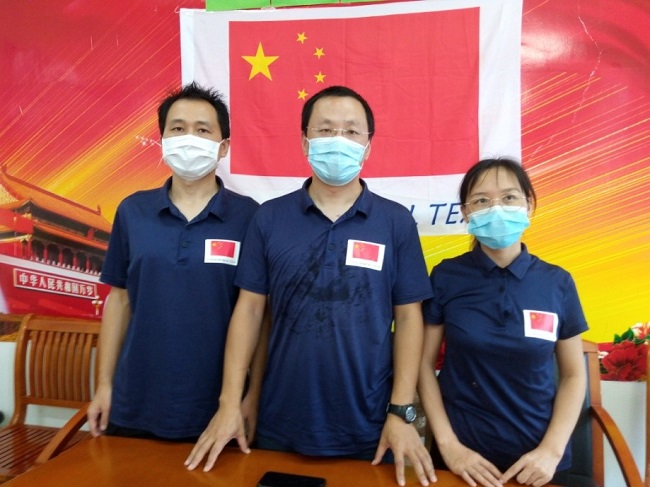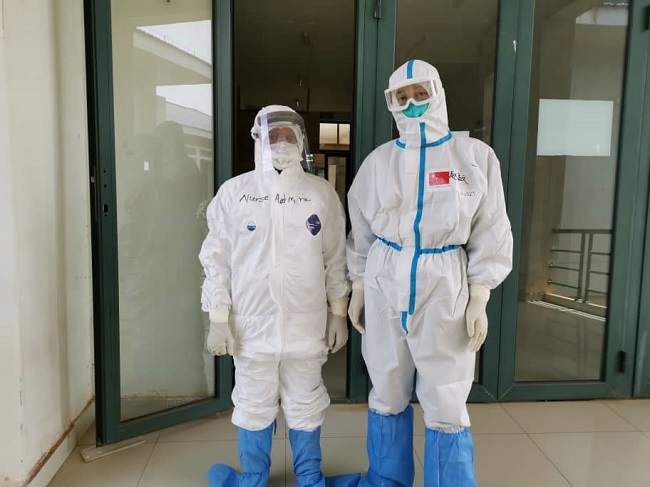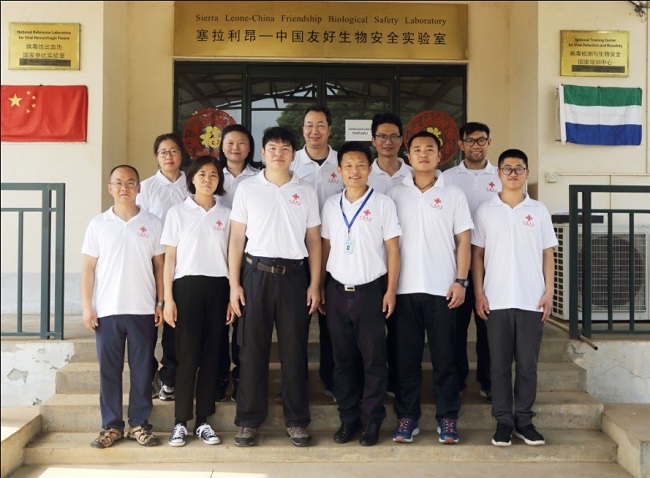Chinese medical teams provide major boost to Sierra Leone’s health system
Three Chinese medical expert teams are currently scoring major successes in developing Sierra Leone’s health sector. Since their arrival in the West African nation, the Chinese medics have been widely acclaimed by Sierra Leone’s government and people for not only playing key roles in treating cases like malaria, typhoid fever, diarrhea, and other contagious diseases, but for also being on the forefront in diagnosing and treating coronavirus (COVID-19) cases. Two of the teams, which arrived in the country in July 2019, had their mission ended on 30th June 2020. Due to the non-availability of flights and the important role they have been playing in complementing the government of Sierra Leone’s fight against COVID-19, the three Chinese medical teams have decided to extend their stay, continuing their work to ensure a healthy society.
Recently, the Chinese medical experts have been working side by side and around the clock with their Sierra Leonean counterparts in detecting, diagnosing, and treating COVID-19 cases.
China and Sierra Leone have emerged as genuine and reliable partners, and since the establishment of diplomatic ties 49 years ago, the two countries have gone a long way in conducting practical cooperation in infrastructure construction, fishery, agriculture, public health, education, and human resource development.
The Chinese Medical Team at Jui Hospital

Team Leader Dr. Jiang Haibo (middle) with two Senior Medical Experts
The team, attached to the Sierra Leone-China Friendship Hospital at Jui in Freetown, is comprised of three physician doctors, three surgical doctors, one NVV doctor, one Chinese traditional medicine expert, one laboratory expert, and three nurses.
Dr. Jiang Haibo, team leader of the Chinese medical team at the Sierra Leone-China Friendship Hospital in Sierra Leone, revealed that they have been working relentlessly in providing medical support in areas like surgery, observation, treatment, administering Chinese medicines, skills transfer to local staff, laboratory management, etc., before the COVID-19 outbreak in Sierra Leone.
He named malaria as one of the most effective diseases in Sierra Leone for which they have trained local staff, such as laboratory technicians, on how to diagnose and treat. Their partnership with local staff has led to the discovery of Olva malaria, which was diagnosed in a patient who has been taken to several hospitals in Sierra Leone without any solution. “We normally do a joint consultation with the local staff on how to treat complicated cases, and we have successfully treated three cases that required intensive care. They all recovered successfully and were discharged,” he said, adding that they also use Chinese traditional medicines to treat some cases.
Another disease the Chinese medics have been treating is cataracts, which is an eye disease that is different in Sierra Leone due to the strong sunlight, according to Dr. Jiang Haibo, noting that most patients find it extremely difficult to undergo surgery, but the Chinese medical team has successfully remedied 22 cases before the outbreak of COVID-19.
Pediatrician Zhao Mengwen said they have treated lots of children with diseases like malaria, typhoid fever, upper respiratory diseases, and they have trained local doctors and nurses on how to manage cases like convulsion and other respiratory infections. He revealed that children infected with COVID-19 have been referred to the Chinese Hospital. “We have been working closely with the Ola During Memorial Hospital for children in treating cases,” he said.
Since the arrival of the Chinese medical team in July 2019 to March 2020, it has treated 18, 000 outpatients, admitted 963 patients, conducted 277 surgeries, carried out 34, 000 tests on drug routines, kidney and blood samples, and administered Chinese traditional medicines to 1,200 patients.
Since the COVID-19 outbreak in Sierra Leone, the Chinese Friendship Hospital has been transformed from a normal hospital to a treatment facility of mostly COVID-19 patients. The hospital is divided into three zones, namely, blue, yellow, and red zones. Most of the local staff who have a wealth of experience in treating the Ebola disease are working with the Chinese medical experts in taking the lead in emergency response, diagnoses, and treatment of COVID-19 patients. Due to training provided to local staff in areas like emergency response, diagnosis, treatment and the proper use of equipment, none of the medical staff been infected with COVID-19.
Seventy-seven COVID-19 patients were admitted to Sierra Leone-China Friendship Hospital, including 12 children under the age of 14 and eight under the age of five. All pediatric patients were cured and discharged, whilst five deaths were recorded due to the severity of the adult patients, most of whom had other medical complications before contracting COVID-19 like diabetes, hypertension, HIV/AIDS, drug abuse and hepatitis. COVID-19 patients, like children who are treated and discharged at the Sierra Leone-China Friendship Hospital, are followed up to ensure that they are ok.
“We want to see the Sierra Leone-China Friendship Hospital go back to the normal treatment of various disease, because most people in Sierra Leone are in dire need of quality medical services,” says Dr. Jiang Haibo, adding “the patients need us and we too are missing those times when we were treating normal health complications.”
The Chinese Military Medical Experts Group

Chinese team doctors wear their personal protective equipment, ready to help Sierra Leone fight COVID-19
The Chinese Military Medical Expert Group (CMMEG) is comprised of 12 medical experts dispatched by the People's Liberation Army of China to Sierra Leone to support the African country’s health sector. Since its arrival in July 2019, the professional medics have been doing laboratory tests and case management of various diseases like malaria, typhoid fever, HIV and AIDS, hepatitis B, and other related cases. Over 3, 500 cases have been diagnosed and treated by the Chinese team before the COVID-19 outbreak in Sierra Leone.
According to the team leader, Dr. Zhao Guangyu said their center at the Wilberforce Army Barracks in Freetown, Sierra Leone’s capital, was transformed into a COVID-19 center and they were given the specific duty of performing tests on samples collected and conducting treatment on COVID-19, especially critical cases. The center diagnosed the first COVID-19 case in Sierra Leone and has discharged the first batch of treated patients.
Dr. Zhao Guangyu said more than 1,000 samples have been tested and nearly 200 patients, some of whom are in critical condition, were treated. “We are operating the best center for COVID-19,” he remarked and furthered that they have ventilators, oxygen, and other equipment for critical cases. CMMEG has been working closely with local staff and has been collaborating with other medical teams like the Cuban medical team and some non-governmental organizations.
“We have extended our stay in Sierra Leone to help fight the COVID-19,” he said and that they have been sharing experiences with their colleagues in China and also share ideas with local staff on how to better treat COVID-19 cases.
“We believe that China and Africa are working together to build an even closer community with a shared future. We consider the local staff in Sierra Leone as part of our family. We are working as a team to build a community of common health for the good of all,” the team leader said.
The co-team leader of CMMEG, Zheng Junjie is an expert in the clinical area. He has been working with the team on infection prevention and control for diseases in Sierra Leone, revealing that they have been working side by side with their Sierra Leonean counterparts on skills transfer.
“I am happy to work with committed and friendly local experts,” he said and stated that Sierra Leone has a great future especially with a young population that is striving for development. “I hope COVID-19 will soon be a thing of the past, and that the team will continue to support Sierra Leone’s health sector,” Zheng Junjie said.
The Chinese Center for Disease Control and Prevention

The China CDC Team in Sierra Leone
The Chinese Center for Disease Control and Prevention (China CDC) team arrived in Sierra Leone in mid-December last year with the task of implementing the second technical assistance project of Sierra Leone's fixed biosafety laboratory from the China CDC. Dr. Wu Wei, the deputy team leader, revealed that the project is a follow-up project of China's assistance to the public health improvement of Sierra Leone since the Ebola period in 2014. “It aims to help Sierra Leone improve its capacity to prevent and control infectious diseases,” he said and added that it has been carried out for nearly three years.
Since the outbreak of COVID-19, the 11 members of the CDC China team has shifted its focus to fighting the coronavirus for Sierra Leone. The team, according to the deputy team leader, has always maintained good communication and collaboration with Sierra Leone's Ministry of Health and Sanitation (MOH), World Health Organization, World Bank, and other international organizations.
The experts of the team participated in nearly 40 special meetings on the prevention and control of COVID-19 in Sierra Leone, exchanged views over the situation and experience of COVID-19 in China, and worked hard in policy-making about the technical strategies and plans for prevention and control of COVID-19 in Sierra Leone, and gave suggestions for addressing the issue of COVID-19 in this country.
In the Sierra Leone-China Friendship Fixed Biosafety Laboratory, the team established the molecular test method for the coronavirus based on third-generation sequencing technology on Jan. 20, 2020. At the same time, the team applied urgently to the headquarters of China CDC for deployment of the new coronavirus nucleic acid detection reagents and established fluorescence quantitative PCR test method for COVID-19 on Feb. 5.
This is also one of the first laboratories in the country to establish the routine molecular test method for the coronavirus. After the spread of COVID-19 in Africa, this lab was immediately designated as a national test laboratory for coronavirus by the Sierra Leone Government.
The lab is responsible for new coronavirus nucleic acid testing and training for this country and successfully passed the required internal laboratory assessments for the new coronavirus test from the MOH. On Feb. 14, the team tested the first sample of a suspected COVID-19 case, marking the official start of emergency testing for COVID-19 in Sierra Leone.
Since then, the expert team has been on standby almost 24 hours a day for emergency detection of COVID-9 and has performed multiple emergency tests required by the MOH. After identifying the first nucleic acid positive sample of COVID-19 on March 31, as of Aug. 2, 2020, the team has done nucleic acid testing for a total of 5,525 suspected cases and close contacts for Sierra Leone (accounting for 30.4% of all tests in Sierra Leone) with 670 positive cases for COVID-19 (accounting for 36% of all reported positive cases in Sierra Leone).
The team has organized professional training to help improve the capabilities of local professionals in Sierra Leone. In mid-February, when the team conducted training on disease surveillance projects in 10 hospitals in Sierra Leone, they introduced the knowledge and the technology accumulated in China's experience of fighting COVID-19. Since March, the expert team has held three professional technical training courses in the capital and in the capital city of the southern province, Bo. A total of more than 60 public health professionals of Sierra Leone have been trained in personal protection, sample collection, and nucleic acid testing.
In May, the expert group provided financial support for the MOH of Sierra Leone in educational materials of hepatitis and COVID-19 (T-shirts, leaflets, etc.). In June, the expert group provided additional financial support for the MOH to supervise the COVID-19 work in regional laboratories. At the same time, under the unified coordination of the Chinese Embassy in Sierra Leone, the expert team promptly donated some personal protective supplies to the Sierra Leone government for the combat of COVID-19. What's more gratifying is that, under the guidance and training of the expert group, the local employees of the laboratory have fully been able to independently conduct the COVID-19 test.
Since February of this year, the team has always actively helped Sierra Leone in fighting COVID-19, which promoted the understanding and close cooperation with the MOH of Sierra Leone and deepened the traditional friendship between the two countries. The working ability and professionalism of the team have been highly recognized and praised by the MOH of Sierra Leone and other international agencies. “We are glad that our work helped enrich the Sierra Leone-China friendship,” Dr. Wu Wei said.


